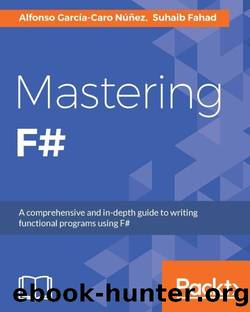Mastering F# by Alfonso Garcia-Caro Nunez & Suhaib Fahad

Author:Alfonso Garcia-Caro Nunez & Suhaib Fahad [Nunez, Alfonso Garcia-Caro]
Language: eng
Format: mobi
Publisher: Packt Publishing
Published: 2016-11-29T16:00:00+00:00
Note
Note that you should always keep the reply channel as the last parameter in your union type definition.
To use this calculator agent, we will simply create an object and use the APIs that are exposed to us:
> let c = new CalculatorAgent();; > c.Add(10, 20);; val it : int = 30
Likewise, if we are inside an async block, then we can call the async functions to evaluate the results.
Agents and errors
Good error detection, reporting, and logging are essential in actor programming. Let's take a look at how to detect and forward errors when using F# mailbox processors.
F# async workflows catch exceptions and propagate them automatically within async { ... } blocks, even across async waits and I/O operations. You can also use try /with , try /finally , and use constructs within the async { ... } blocks to catch exceptions and release resources. This means that we will only need to deal with uncaught errors in agents. When an errors is uncaught in the MailboxProcessor class, the Error event on the agent is raised. A common pattern is to forward all errors to a supervising actor, as shown in the following code block:
let error_supervisor = MailboxProcessor<System.Exception>.Start(fun inbox -> async { while true do let! err = inbox.Receive() printfn "an error '%A' occurred in an agent" err }) let agent = new MailboxProcessor<int>(fun inbox -> async { while true do let! msg = inbox.Receive() if msg % 100 = 0 then failwith "I don't like that cookie!" }) agent.Error.Add(fun error -> error_supervisor.Post error) agent.Start()
The preceding example reports an error when we have received 100 messages. When executing the following error agent, MailboxProcessor does not have more supervision capabilities built in:
an error 'I don't like that cookie!' occurred in an agent
If we want more advanced functionality, for example, making the supervisor restart the failing actor, we will need to implement it ourselves. In Chapter 10 , Distributed Programming with F# , we will see how supervision is a central concept in another actor system implementation, Akka.NET.
Download
This site does not store any files on its server. We only index and link to content provided by other sites. Please contact the content providers to delete copyright contents if any and email us, we'll remove relevant links or contents immediately.
| Coding Theory | Localization |
| Logic | Object-Oriented Design |
| Performance Optimization | Quality Control |
| Reengineering | Robohelp |
| Software Development | Software Reuse |
| Structured Design | Testing |
| Tools | UML |
The Mikado Method by Ola Ellnestam Daniel Brolund(22564)
Hello! Python by Anthony Briggs(21748)
Secrets of the JavaScript Ninja by John Resig Bear Bibeault(20323)
Dependency Injection in .NET by Mark Seemann(19650)
The Well-Grounded Java Developer by Benjamin J. Evans Martijn Verburg(19428)
Kotlin in Action by Dmitry Jemerov(19376)
OCA Java SE 8 Programmer I Certification Guide by Mala Gupta(18859)
Algorithms of the Intelligent Web by Haralambos Marmanis;Dmitry Babenko(17665)
Adobe Camera Raw For Digital Photographers Only by Rob Sheppard(16969)
Grails in Action by Glen Smith Peter Ledbrook(16816)
Test-Driven iOS Development with Swift 4 by Dominik Hauser(10954)
Becoming a Dynamics 365 Finance and Supply Chain Solution Architect by Brent Dawson(8071)
Microservices with Go by Alexander Shuiskov(7834)
Practical Design Patterns for Java Developers by Miroslav Wengner(7735)
Test Automation Engineering Handbook by Manikandan Sambamurthy(7697)
Angular Projects - Third Edition by Aristeidis Bampakos(7181)
The Art of Crafting User Stories by The Art of Crafting User Stories(6629)
NetSuite for Consultants - Second Edition by Peter Ries(6550)
Demystifying Cryptography with OpenSSL 3.0 by Alexei Khlebnikov(6324)
